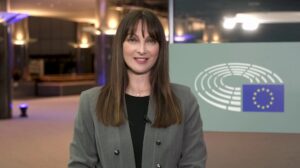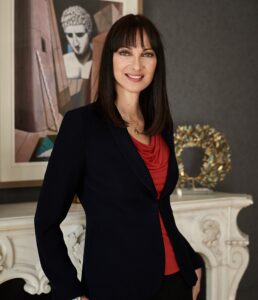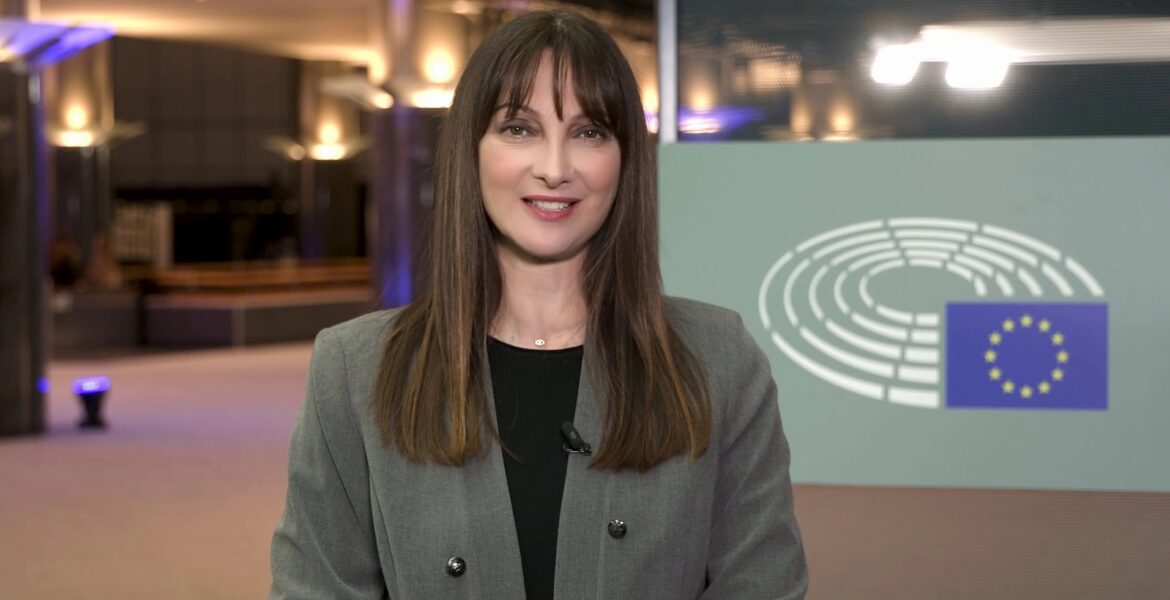Elena Kountoura, a prominent Greek politician, Member of the European Parliament, and former Minister of Tourism from 2015 to 2019, seamlessly transitioned from a thriving international modelling career to dynamic leadership in public service. Born in Athens, her early athletic prowess set the stage for a multifaceted journey. Graduating from the National Gymnastic Academy and the University of Athens, she excelled both on the track and in academia. As a model, she graced renowned campaigns and collaborated with industry icons. Returning to Greece, she ventured into politics, advocating for her constituents with unwavering dedication. Her commitment to philanthropy and multilingual fluency further enrich her impactful contributions, embodying a remarkable blend of glamour and governance. Greek City Times was fortunate to catch up with Elena to learn more.

What childhood memory stands out most vividly for you? How has it left a lasting imprint on your life?
At the age of 11, I watched track and field games for the first time on TV. I was impressed by the athletes’ efforts and deeply moved by the compelling rise of the Greek flag. The strong desire to become an athlete and to honour my country grew inside me. It was a striking moment. That day marked my soul and it was the very beginning of my involvement with sports. I worked hard with daily practice, as a member of the Greek National Track and Field Team, becoming a Champion in the High Jump and 100-meter hurdles, holding national records and international awards. I learned to set ambitious goals, to overcome obstacles with persistence and hard work. I embraced the principles of fair play, teamwork and respect. These are values that I carried throughout my entire professional career in sports, fashion, publishing, and politics. And I feel proud that in each of these cycles of life, I had the honour to represent and support my country.
Is the influence of your family significant in your decision-making? Do they rank highest on your priority list?
Family always comes first and we share a very strong bond. My husband and two sons have been very understanding and supportive, recognising the high responsibility I had assumed, as Tourism Minister of Greece and now as a Member of the European Parliament. Their opinion is always important to me. But there have been some critical moments in politics, when I had to make tough decisions, based on my conscience, that affected my family due to the large publicity I attracted. I had no other choice, but to stay true to my beliefs. My family stood by me in all the tough moments, and for that, I feel blessed.
What motivated your transition from the glamorous world of modelling to a more humble and service-oriented role in politics?
My life goal has been to bring positive change into people’s lives. I have been involved in volunteerism and social work during school, university and throughout my professional career. The fashion industry has been just one part of my life and its glamour is only one side of the coin. The other side of it involves very hard work. My international career in fashion was built on exhausting working hours and a highly professional attitude. I always say that it might be easy to reach the top, but enormous effort is required to remain at the top. When I decided to return to Greece, it was because I wanted to have a family and to offer my international experience and knowledge to better people’s lives. I became the publisher of very successful magazines, for the well-being of women, children and families, with a strong focus on social issues, such as women’s empowerment, juvenile delinquency and health. A strong advocate in the fight against breast cancer, as President of Europa Donna Hellas, the Greek branch of the Europa Donna- European Breast Cancer Coalition. I entered politics, 20 years ago, carrying a significant experience of social and volunteer work and a strong desire and passion to support human rights in all aspects of life.
How would you define politics and how difficult is it to serve the citizens of a nation?
Politics is all about engaging with people, caring for their needs and being able to act effectively to their benefit. Citizen’s vote is a choice of trust and a message for politicians to stand up to people’s expectations, address their needs and provide solutions. Serving the citizens requires putting their interests first, respecting them and being truthful to them. It is a lifetime commitment, that not all those who enter politics are ready for. It is a great honour to be serving my country.
It’s a common understanding that those who reign and rule often start to perceive things differently. How does this apply to your perspective?
Unfortunately, it happens. Several public figures, once in power, have changed and lost the common sense of moderation and balance. It is important to maintain your focus on keeping fighting for all the right reasons, that initially inspired you to get into politics. Those who stop seeing themselves as servants of the people and begin acting as rulers are misled by their own faults and eventually fail.
What aspirations do you have for Greece that remain unrealised due to entrenched obstacles like bureaucracy and financial constraints??
When I took office as Minister of Tourism in 2015, Greece had already been suffering from a harsh fiscal and social crisis. With the innovative, globally awarded, national tourism policy we launched during my term for Greece as an attractive 365-day destination, we managed to increase by 40 percent the volume of incoming tourism and by 35 percent tourism revenues. Those historical records allowed the implementation of economic and social policies needed at the time. The tourism miracle we achieved, commended by global institutions, such as the World Tourism Organization UNWTO and the World Travel and Tourism Council WTTC, was a catalyst for our economy’s recovery, business activity and job creation. Our government’s program at that time led Greece out of the crisis and our economy back on growth, and at the same time introduced a new framework for public administration, for minimising bureaucracy and supporting investments. We were able with very little economic resources, to restore our economy, our country’s image, credibility and confidence.
What initiatives are being prioritised to boost investment levels in Greece?
One of my accomplishments that I am very proud of, is that we enhanced our country’s attractiveness as a global destination, not only for tourism, but also for new investments. We attracted more than 400 new high-end investment plans in the Greek hospitality sector. Apart from the added value they bring to several Greek destinations, they have created thousands of new jobs and sources of income. Greece, having been established as one of the five most popular global destinations in Europe, was able to have a swift recovery from the pandemic crisis. Today, at the European Parliament, following a prolonged period of crises, I have strongly advocated for tourism to be placed high on the European Agenda and called for the adequate support of SMEs which are the backbone of the European and the Greek economy, to become strong and competitive again. One of our major accomplishments is that I initiated the work up-taken by the European Parliament for the first European strategy for sustainable tourism in the EU, which reflects the Greek national tourism policy we had implemented. What Greece needs today, is to invest heavily in modern, sustainable and resilient infrastructure, so that our wonderful destinations will be ready to manage tourism flows while maximising benefits for the local communities, and overall cover the country’s need for future growth.

Discussions surrounding women’s empowerment abound, but does it truly manifest in our contemporary society? Are there instances where men resist or undermine efforts toward this goal?
Despite the progress over the past decades, we are still behind. We will need another 300 years globally, according to the UN, and about 60 years in the EU, to achieve gender equality. Women remain more vulnerable to lower incomes, because of the gender pay gap and are more exposed to poverty, discrimination and gender-based violence.
I had the honour of being the European Parliament’s Rapporteur in the report regarding the impact of intimate partner violence and custody rights on women and children. With my report, which was adopted as a European Parliament resolution, and my interventions as a member of the gender equality Committee, FEMM, we put pressure on European institutions and accomplished historic victories: the EU ratification of the Istanbul Convention, the first international legally binding document on combatting gender-based violence, the “Women on Boards” directive for a balanced representation of women in high-responsibility positions and overall for women’s empowerment, and most recently the agreement on a European directive combating several forms of gender-based crimes. Through several reports, I have pushed also for the criminalisation of cyber-violence, which has sharply risen, and for the protection of both women and children. No economy and no society can make substantial steps forward when discriminations still exist. We should not forget, that we are all different but equal. We all have the same rights to a life with dignity, free of violence, and equal chances.
The Mediterranean region holds the title of the world’s top tourist destination. Do you believe its ecosystem is in jeopardy, and if so, what measures can be taken to improve its condition?
The Mediterranean is a precious ecosystem of life on land and below water, but also a cradle of diverse culture, history and civilisations that makes it one of the top global tourism destinations. Yet, the future of the Mediterranean is under threat and concerns us all. A common vision and strategy are required for its environmental protection, and especially for the well-being of people living in the Med, who are the first to be impacted. No country can do it alone. Even more now, as we deal with severe challenges, such as the energy crisis and high inflation, we must make sure that the green and digital transition of Europe towards sustainability will be socially fair and inclusive, especially for the most vulnerable citizens and local communities. We need to cooperate, create crisis management mechanisms and set more ambitious common targets and deadlines for zero net. Such should be the case for tourism and travel. We also need to align our national strategies and policies and act together for the protection of the environment, but also for sustainable business activity and sustainable jobs in the whole region. Because in the end, tourism is all about connecting people and places, and tourism’s workforce is its strongest asset. My vision is for the Med area, and countries like Greece, to become front-runners in the efforts for a sustainable future, that leaves no one behind.
Do you think the European Union consistently expresses solidarity with all its member countries? And do they collaborate effectively for the collective benefit, showing mutual respect?
The EU has accomplished to provide a shared sense of belonging to the great European family. Being a European citizen means that you can move freely, live, study and work in any country of the EU. European legislation is constantly being updated and adopted into the national law of countries that affect daily life, such as consumer protection, public health and food safety, the internal market, the green and digital transition. The most basic of all is human rights, which are the fundamental principle and value of the European Union: the right to self-determination, freedom of speech and expression, protection of the most vulnerable citizens, equality and social justice. It is a fact that while each EU country works for common progress, it is also committed to its own national interests. And, especially in times of crises, it is of paramount importance that decisions made do not benefit the most powerful countries at the cost of countries of less influence. Collective progress has come through countless claims, negotiations, compromises but also through successful collaboration. The European Parliament, therefore has a crucial role. It is the only institution directly elected by the people, representing and voicing their interests. We bear a great responsibility to work and push relentlessly to safeguard the non-negotiable human values and to ensure the rights and interests of all EU citizens and all EU countries with the vision and goal of a better Europe, with more democracy, peace, justice and solidarity.
Make a wish for the future.
I wish we all collectively work harder to put an end to wars. It is outrageous that people, young children, women and elders die violently and fundamental human rights are being brutally violated every day. We need more than just words and good intentions about peace. We need strong political will, commitment through dialogue and negotiations, and swift action. We must all together prove that we work for a world, where every human being is treated equally, with justice, for a society that will give all the opportunity to have a life with dignity, respect and the prospect of a better future.
Read also Musk’s Bold Predictions: AI to Surpass Combined Intelligence of the Human Race by 2029


